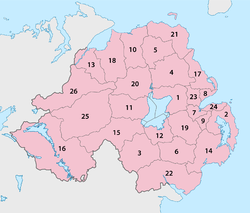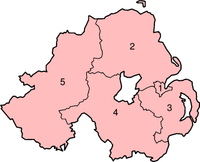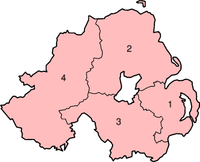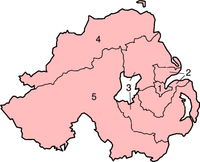- Local government in Northern Ireland
-
Northern Ireland 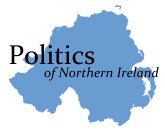
This article is part of the series:
Politics and government of
Northern IrelandNI in the UKNI in the EULocal Government
Northern Ireland is divided into 26 districts for local government purposes. In Northern Ireland local councils do not carry out the same range of functions as those in the rest of the United Kingdom, for example they have no responsibility for education, for road building or for housing (though they do nominate members to the advisory Northern Ireland Housing Council). Their functions do include waste and recycling services, leisure and community services, building control and local economic and cultural development. They are not planning authorities, but are consulted on some planning applications. The collection of rates is handled by the Land and Property Services agency. The councils of the 26 districts are variously styled 'district councils', 'borough councils', 'city councils' and 'city and district councils'.
Contents
Districts
- Antrim
- Ards
- Armagh
- Ballymena
- Ballymoney
- Banbridge
- Belfast
- Carrickfergus
- Castlereagh
- Coleraine
- Cookstown
- Craigavon
- Derry
History
The current pattern of local government in Northern Ireland, with 26 councils, was established in 1973 by the Local Government (Boundaries) Act (Northern Ireland) 1971 and the Local Government Act (Northern Ireland) 1972 to replace the previous system established by the Local Government (Ireland) Act 1898. The system is based on the recommendations of the Macrory Report, of June 1970, which presupposed the continued existence of the Government of Northern Ireland to act as a regional-level authority.[1]
From 1921 to 1973, Northern Ireland was divided into six administrative counties (subdivided into urban and rural districts) and two county boroughs. The counties and county boroughs continue to exist for the purposes of lieutenancy and shrievalty.[2]
Elections
Councillors are elected for a four-year term of office under the single transferable vote (STV) system. Elections were last held in May 2005. The elections due in 2009 were postponed in anticipation of local government reform.[3] With the abandonment of the reorganisation, the elections were held in May 2011, with the next polls due in May 2015. In order to qualify for election, a councillor candidate must be:
- at least 18 years of age, and
- a British, Irish, Commonwealth or European Union citizen.
In addition, he or she must either:
- be a local elector for the district, or
- have, during the whole of the 12-month period prior to the election, either owned or occupied land in the district, or else resided or worked in the district.
For local government purposes, Northern Ireland was previously divided into six administrative counties and two county boroughs, with various rural districts and urban districts in the counties. This system, with the abolition of rural districts, remains the model for local government in the Republic of Ireland. See: List of rural and urban districts in Northern Ireland for more details.
Combinations
The districts are combined for various purposes.
Education and libraries
There are currently five education and library boards (ELBs) in Northern Ireland.
As part of the Review of Public Administration process, the library functions of the ELBs were taken over by a new body, the Northern Ireland Library Authority (branded Libraries NI) in April 2009.[4]
The education and skills functions were to have been centralised into a single Education and Skills Authority in January 2010, but this has been postponed.[5][6]
The boards are as follows:
Health and social care
There were four health and social services boards which were replaced by a single Health and Social Care Board in April 2009.[7]
The former health and social services boards were as follows:
Eurostat NUTS level 3
In the Eurostat Nomenclature of Territorial Units for Statistics (NUTS), Northern Ireland is divided into five parts at level 3
Proposed reform
Main article: Proposed reform of local government in Northern IrelandIn June 2002 the Northern Ireland Executive established a Review of Public Administration to review the arrangements for the accountability, development, administration and delivery of public services. Among its recommendations were a reduction in the number of districts.[8] In 2005 Peter Hain, the Secretary of State for Northern Ireland, announced proposals to reduce the number of councils to seven.[9] The names and boundaries of the seven districts were announced in March 2007.[10] In March 2008 the restored Northern Executive agreed to create eleven new councils instead of the original seven.[11][12][13] The first elections were due to take place in May 2011. However by May 2010 disagreements among parties in the executive over district boundaries were expected to delay the reforms until 2015.[14] In June 2010 the proposed reforms were abandoned following the failure of the Northern Ireland Executive to reach agreement.[15][16]
See also
- List of districts in Northern Ireland by area
- List of districts in Northern Ireland by population
- List of districts in Northern Ireland by population density
- List of districts in Northern Ireland by community make-up
- ISO 3166-2:GB, subdivision codes for the United Kingdom
- Local government in England
- Local government in Scotland
- Local government in Wales
- Local government in the Republic of Ireland
- Political make-up of local councils in Northern Ireland
References
- ^ "Report of the Review Body on Local Government in Northern Ireland 1970. Chairman: Patrick A. Macrory, Esq. (Cmnd 546 )". CAIN Web Service - Conflict and Politics in Northern Ireland (University of Ulster). Belfast: HMSO. June 1970. http://cain.ulst.ac.uk/hmso/macrory.htm#9. Retrieved 16 September 2011.
- ^ The Northern Ireland (Lieutenancy) Order 1975 (S.I. 1975 No.156)
- ^ "NI local elections are postponed". BBC News. 25 April 2008. http://news.bbc.co.uk/2/hi/uk_news/northern_ireland/7367253.stm. Retrieved 27 April 2008.
- ^ http://www.ni-libraries.net/news/campbell-officially-launches-a-new-era-in-libraries/
- ^ http://www.northernireland.gov.uk/news/news-de/news-de-081208-assembly-supports-new.htm
- ^ http://www.esani.org.uk/docs/convergence_faqs_aug10.pdf
- ^ Health and Social Care Board
- ^ "Review of Public Administration". Northern Ireland Executive. http://www.northernireland.gov.uk/index/review-of-public-administration-2.htm. Retrieved 8 July 2010.[dead link]
- ^ Major reform of local government, BBC News
- ^ Revised Recommendations for new council boundaries unveiled, press release, 30 March 2007
- ^ NI councils reduced from 26 to 11
- ^ Proposal for 11 new NI councils, BBC News
- ^ Foster announces the future shape of local government, NI Executive
- ^ "Plan to cut Northern Ireland councils may be delayed until 2015". Belfast Telegraph. 7 May 2010. http://www.belfasttelegraph.co.uk/news/politics/plan-to-cut-northern-ireland-councils-may-be-delayed-until-2015-14796633.html#ixzz0oqCDB5Hm. Retrieved 24 May 2010.
- ^ "The executive fails to agree a deal on council reform". BBC News. 15 June 2010. http://news.bbc.co.uk/2/hi/uk_news/northern_ireland/10314865.stm. Retrieved 8 July 2010.
- ^ "Local Government Association Incensed as Minister Stops the Reform Process". Northern Ireland Local Government Association. 15 June 2010. http://www.nilga.org/news_detail.asp?id=360&parent=0&pid=1&area=2&aNAme=Public. Retrieved 8 July 2010.
External links
- NI Direct - Local Council Websites
- NI Local Government Association
- Review of Public Administration NI
- Local Government Boundaries Commissioner for Northern Ireland
- DOENI - Local Government
- Macrory Report
- Local Government (Boundaries) Act (Northern Ireland) 1971
- Northern Ireland Councillor's Handbook
 Administrative geography of the United Kingdom
Administrative geography of the United KingdomUnited Kingdom • Local government • History England • Local government • History Subdivisions: Regions • Ceremonial counties • Metropolitan and non-metropolitan counties • Unitary authorities • Districts (list) • Civil parishes (list)Northern Ireland • Local government • History Subdivisions: Counties • DistrictsScotland • Local government • History Wales • Local government • History Local government in Europe Sovereign
states- Albania
- Andorra
- Armenia
- Austria
- Azerbaijan
- Belarus
- Belgium
- Bosnia and Herzegovina
- Bulgaria
- Croatia
- Cyprus
- Czech Republic
- Denmark
- Estonia
- Finland
- France
- Georgia
- Germany
- Greece
- Hungary
- Iceland
- Ireland
- Italy
- Kazakhstan
- Latvia
- Liechtenstein
- Lithuania
- Luxembourg
- Macedonia
- Malta
- Moldova
- Monaco
- Montenegro
- Netherlands
- Norway
- Poland
- Portugal
- Romania
- Russia
- San Marino
- Serbia
- Slovakia
- Slovenia
- Spain
- Sweden
- Switzerland
- Turkey
- Ukraine
- United Kingdom
- (England
- Northern Ireland
- Scotland
- Wales)
States with limited
recognition- Abkhazia
- Kosovo
- Nagorno-Karabakh
- Northern Cyprus
- South Ossetia
- Transnistria
Dependencies
and other territories- Åland
- Faroe Islands
- Gibraltar
- Guernsey
- Jan Mayen
- Jersey
- Isle of Man
- Svalbard
Other entities Categories:- Subdivisions of Northern Ireland
- Government of Northern Ireland
- Politics of Northern Ireland
- Local government in the United Kingdom
Wikimedia Foundation. 2010.

